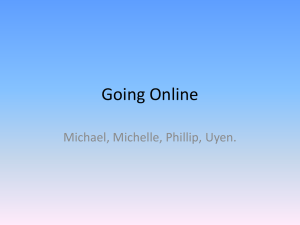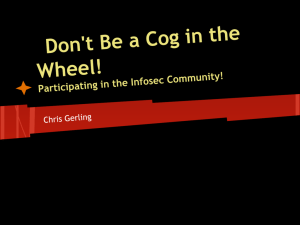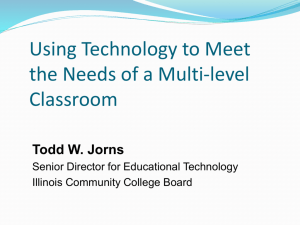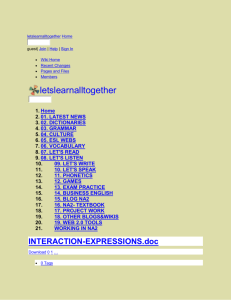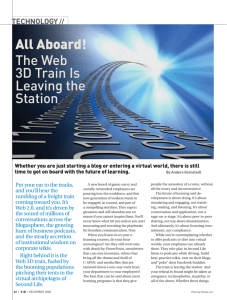Web 2.0 Tools
advertisement
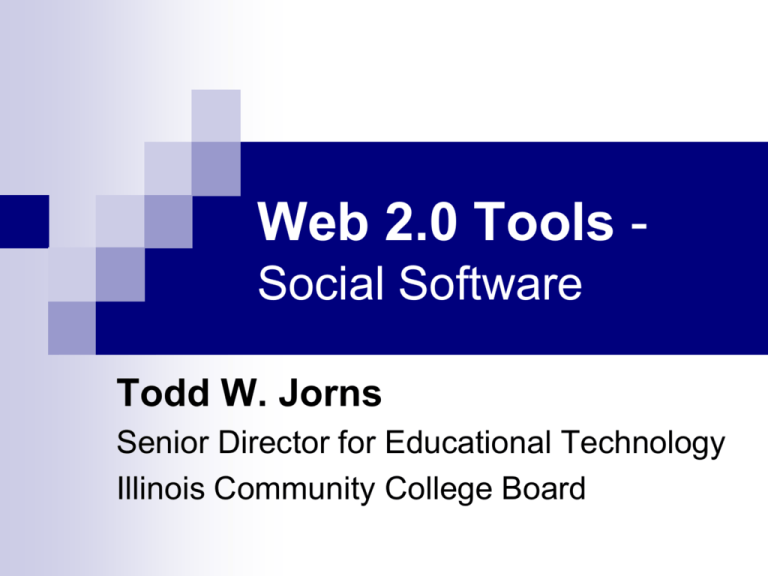
Web 2.0 Tools Social Software Todd W. Jorns Senior Director for Educational Technology Illinois Community College Board Definition “Web 2.0 is a set of economic, social, and technology trends that collectively form the basis for the next generation of the Internet – a more mature, distinctive medium characterized by user participation, openness, and network effects." O'Reilly Radar Technologies Wikis Blogs Podcasts/Vodcasts Social Networking Sites Wikis A wiki is computer software that allows users to easily create, edit and link web pages – Social Knowledge tool. Wikis are often used to create collaborative websites, power community websites, and are increasingly being installed by businesses to provide affordable and effective Intranets for Knowledge Management. Wikis Ward Cunningham, developer of the first wiki, WikiWikiWeb, originally described it as "the simplest online database that could possibly work". One of the best-known wikis is Wikipedia. Wikis Benefits Group organizing Writing & knowledge building Community development & building Public or private Wikis - Free Sites pbworks - http://pbworks.com/ wetpaint - http://www.wetpaint.com wikipedia – http://www.wikipedia.org wikispaces - http://www.wikispaces.com Wikis – Software & Example Personal wikis that can be used on your computer or a pen drive (as well as online) TiddlyWiki - http://www.tiddlywiki.com/ MonkeyGTD - http://monkeygtd.tiddlyspot.com/ Wiki-based lesson example: http://www.readwritethink.org/lessons/lesson_vi ew.asp?id=979 Blog Blog is short for Web log. Publicly available web pages, with personal views and links expressing the opinions and observations of a particular person. Usually on a specific topic or theme (political, personal, topical, health, travel, research, etc.) Updated regularly reflecting the personality of the author. Blog Can be online diaries/news forums that feature links to news items and stories from across the Internet's World Wide Web. Most blogs are headed by an individual called a blogger and many of these are people who want to bring their own views online. Other bloggers are journalists or industry insiders who create forums for expressing their opinions without editorial constraint. Blog Benefits Post class materials and class supplements. Integrate all types of multimedia (webpages, audio, video, photos, slideshows, etc.). Comment modes encourage interaction. Team blogs enable engagement. Create a class publication Student journaling & reflection Blog – Free Sites Blogger - http://www.blogger.com Edublogs - http://www.edublogs.org/ LiveJournal - http://www.livejournal.com/ Podbean – http://www.podbean.com Blog Resources More information: http://www.slais.ubc.ca/courses/libr500/05-06wt1/www/A_Cho/history.htm Create a blog in THREE Minutes! http://blogger.com Podcast (iPOD broadCAST) is an audio broadcast that has been converted to an MP3 file or other audio file format for playback in a digital music player or computer. The "pod" in podcast was coined from "iPod," the predominant portable, digital music player, and although podcasts are mostly verbal, they may contain music. Video Podcasts - vodcasts Podcast Using the RSS 2.0 syndication format, podcasts are made available to subscribers just like news feeds. The client program that captures the audio feeds and synchronizes them with the music player is a "podcatcher," such as Curry's own iPodder, available at www.indiepodder.org. Podcasting Process Create Distribute •Record episode •Edit episode •Publish episode to webserver •Reference episode in feed Access • Subscribe using podcatcher • Download episode • Playback episode Podcasting in Education Distribute course content Provide overview of week Distribute lecture content Provide examples Add personalization to online classes Increase student involvement (i.e., presentations) Accommodates mobile learning Student presentations or reflection Podcasting Benefits Low-cost, low-barrier tool for disseminating content Designed for offline listening Content is delivered to students Frees learning from physical constraints Reaches out to auditory learners Podcast Tutorials Podcasting 101 Tutorial.pdf http://www.ilcco.net/ILCCO/index.cfm?page=Resources ION's Pointers & Clickers (Pt. 1) http://www.ion.uillinois.edu/resources/pointersclickers/2 007_03/index.asp ION's Pointers & Clickers (Pt. 2) http://www.ion.uillinois.edu/resources/pointersclickers/2 007_05/index.asp Podcast Tutorials How to Podcast – http://www.how-to-podcast-tutorial.com/ Quick & Dirty Podcasting Primer http://www.stager.org/podcasting/guide.html Podcast – Free Software Audacity - http://audacity.sourceforge.net/ Easy to use Multi-track audio Multi-platform (Mac & PC) Social Networking Sites A Web site that provides a virtual community for people interested in a particular subject or just to "hang out" together. Members communicate by voice, chat, instant message, videoconference and blogs, and the service typically provides a way for members to contact friends of other members. The "social networking site" is the 21st century term for "virtual community.” MySpace MySpace is a social networking website offering an interactive, user-submitted network of friends, personal profiles, blogs, groups, photos, music and videos internationally. Currently the world's sixth most popular English-language website. Third most popular website in the United States, (it has topped the chart on various weeks). Social Networking Examples Friendster (www.friendster.com) was the first social networking site, which was introduced in 2002 MySpace (www.myspace.com) came out in 2003. Facebook (www.facebook.com) came out in 2004 initially targeting college students, but later welcoming everyone. Social Networking Examples TagWorld (www.tagworld.com) introduced tools for creating more personalized Web pages. Tagged (www.tagged.com) introduced the concept of building tag teams for teens with like interests. MyPlace: http://classportals.org/myplace/ Online Resources Jeff Newell's Web 2.0 TiddlyWiki: https://edocs.uis.edu/jnewe2/www/TiddlyWiki_Je ff.html. TiddlyWiki for the rest of us: http://giffmex.org/twfortherestofus.html The World of Blogs: http://www.slais.ubc.ca/courses/libr500/05-06wt1/www/A_Cho/examples.htm Questions Todd.Jorns@illinois.gov (217) 785-0144 www.flip4u.org
